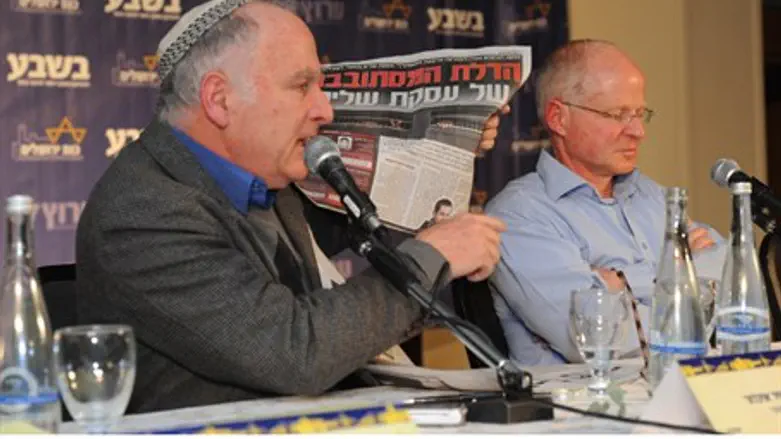
A verbal confrontation broke out on Tuesday between Noam Shalit, father of freed soldier Gilad Shalit, and activists who spoke out against the deal Israel signed with Hamas to free Gilad, which saw 1,026 terrorists being released in exchange for one kidnapped soldier.
The confrontation broke out during a panel at the 9th Jerusalem Conference, sponsored by the Besheva magazine, which dealt with the price that Israel should or should not pay in exchange for its captives.
Participating in the panel, in addition to Shalit, were Attorney Zeev Dasberg, the Chairman of the Legal Institute for Terror Research, whose sister and brother-in-law's terrorist murderers were freed in the Shalit deal, Meir Indor who heads the Almagor Terror Victims’ Organization, and Rabbi Dov Lior of Kiryat Arba, renowned halakhic decisor.
Rabbi Lior gave a Torah lecture at the start of the symposium and stated unequivocally, bringing many rabbinic sources to back him up, that freeing terrorists for a captured soldier was against halakha because of its dangerous results for the future.
Noam Shalit claimed during the panel that his family never asked the government to free terrorists and added, “We fought for our son’s life, and anyone else would have done the same. We did not demand that the government free even a single terrorist. We asked the government to bring Gilad back in whatever way the government chose.”
Shalit noted that his family led activists in attempting to bring pressure on Hamas in order to lower its demands, but that the government had foiled their plans. “We blocked the trucks bringing money to Gaza, but the Israeli government continued to transfer cash and food” he recalled.
He also said that the government and IDF must work now to deter terrorist kidnappings.
Shalit was criticized by Dasberg and Indor, with Dasberg noting that despite the fact that the Shalit family’s actions to bring Gilad back were appropriate for a father who sees the issue on a personal level, on the public level the Israeli government should not have listened to the family.He said that there was no basis in Israeli law for President Peres' signing pardons en masse for the terrorists.
Indor attacked Shalit and held up a newspaper which reported about some of the terrorists who were released in the deal and who have since returned to terrorism.
Dasberg later told Arutz Sheva that the main message coming from the panel is that Israel should not surrender to terrorists.
“The idea is to pressure them,” he said. “Stop the flow of electricity to them, stop giving them food and money and aid. Such pressure may make them realize that terror has no effect.”
Dasberg called on Noam Shalit, who recently announced that he would be running for the Knesset with the Labor party, to fight to ensure that Israel does not give in to terrorists. He noted that Shalit is obligated to do so especially because he is Gilad’s father. It is uncertain whether Shalit would do that kind of about-face after his own experience.
“As Gilad Shalit’s father, he’s supposed to fight against terror and to fight against kidnappings such as what happened to his son,” insisted Dasberg.
Indor told Arutz Sheva that he chose to attack Shalit at the panel because now that Shalit has announced his run for politics, he has laid himself open to criticism.
“We gave them a lot of respect so long as his son was in Hamas’ hands, but once he decided to go into politics and he’s carrying the flag of releasing terrorists, we decided to stop giving respect and tell Israeli society that this man, in our eyes, serves Hamas’ agenda,” said Indor.
“The victims of terror feel that this man is making a career on account of their sacrifice,” he added, rejecting Shalit’s call to be tougher on terrorists.
“He talked about the leaders on one hand, but on the other hand he said he was against making rules for the next kidnapping,” said Indor. “He said that in the Knesset. So his platform will be that when the next soldier is kidnapped, he can’t say to the next family that they can’t get what he got.”
During the Jerusalem Conference, the results of a poll conducted by the Ma’agar Mohot Institute and which surveyed the public opinion about the Shalit deal were presented.
The poll found that a large majority – 71 percent – believe that the Israeli government did the right thing when it agreed to release terrorists for Gilad Shalit. Only 29 percent said they believe that the government was wrong.
At the same time, the poll found that 74 percent of respondents believe that in the future, Israel must set a limit on the number of terrorists that can be freed in exchange for one kidnapped Israeli. Only 26 percent said they believe that no restrictions should be imposed on the number of terrorists that can be freed.
Dasberg said in response that legal issues, such as freeing murderers from jail, can not be decided by polls.